

Knee pain can significantly impact one’s quality of life, affecting mobility, independence, and overall well-being. Whether caused by injury, arthritis, or other conditions, chronic knee pain can limit everyday activities and diminish enjoyment in life. Individuals dealing with knee pain in Thane, India, can turn to Dr. Bakul Arora, a dedicated Knee Replacement Surgeon committed to alleviating discomfort and restoring mobility. Through advanced treatments, including Robotic Knee Replacement Surgery in Thane, Dr. Bakul Arora helps patients regain functionality and enhance their overall quality of life. By addressing the underlying causes of knee pain and delivering personalized care, Dr. Bakul Arora empowers individuals to live actively and without the burden of chronic discomfort.

Dr. Bakul Arora is a distinguished Robotic knee replacement surgeon in Thane known for his expertise in robotic-assisted knee replacement surgery. With years of experience and a commitment to staying at the forefront of medical advancements, Dr. Bakul Arora has garnered a reputation for delivering exceptional patient care and achieving outstanding surgical outcomes.
Traditional knee replacement surgery has long been the standard treatment for severe knee arthritis and other degenerative conditions. However, robotic-assisted knee replacement represents a significant leap forward in precision and accuracy. This advanced approach combines the skills of the surgeon with cutting-edge robotic technology to create a customized surgical plan tailored to each patient’s unique anatomy.
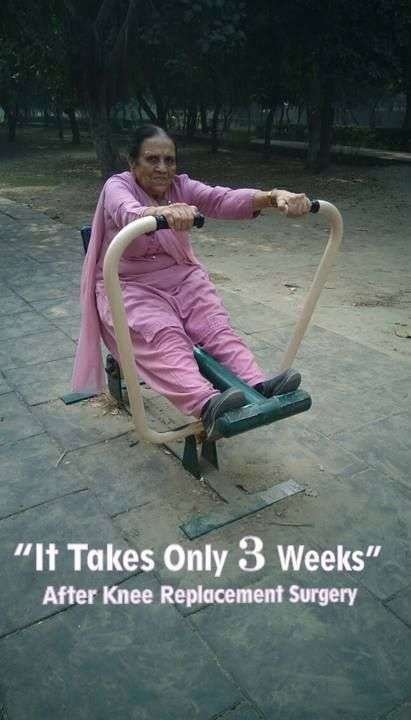

Surgery in Morning , Physiotherapy and Patients Walk in Evening

Physiotherapy , Walking and Staircase Climbing

Discharge from Hospital

Understand The Difference Between Conventional nee Replacement, Minimal Invasive knee Replacement & Robotic Knee Replacement.

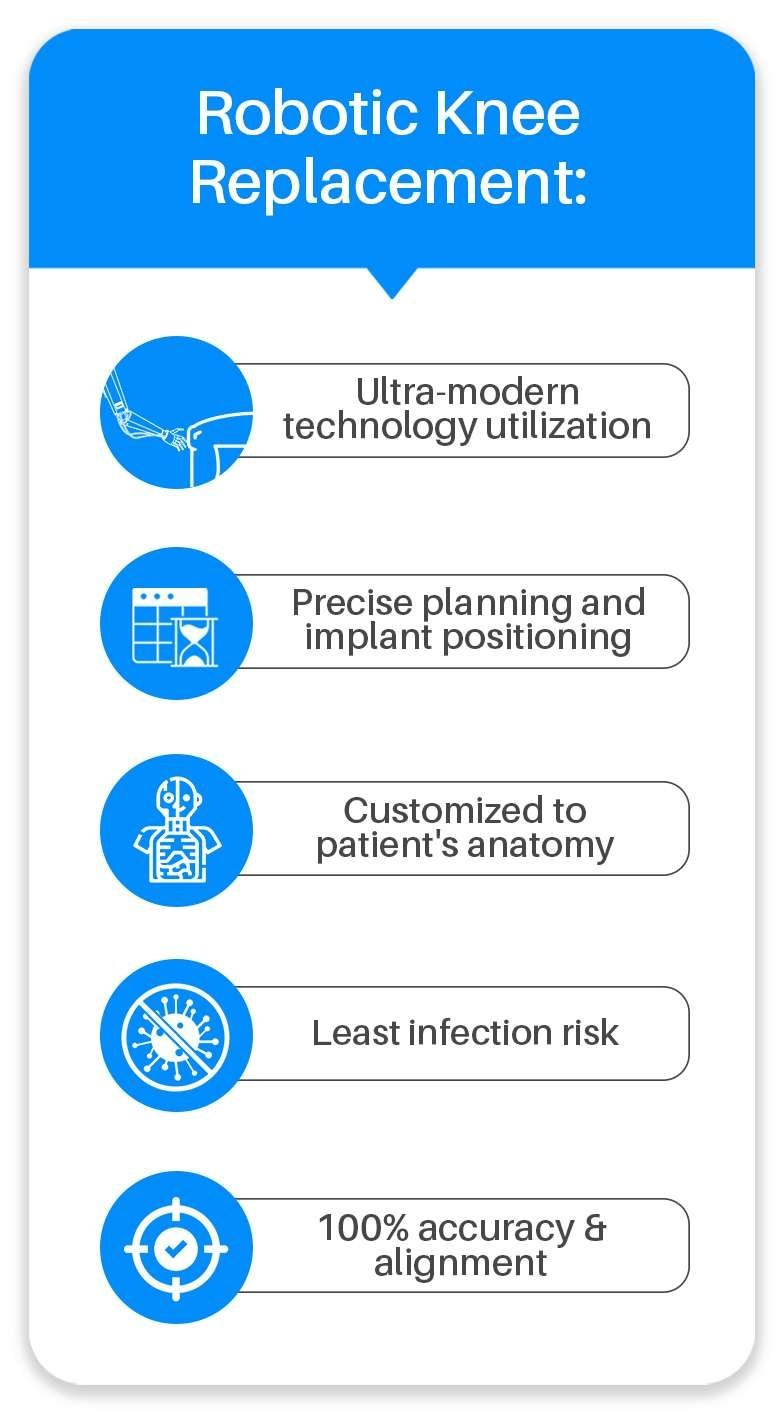
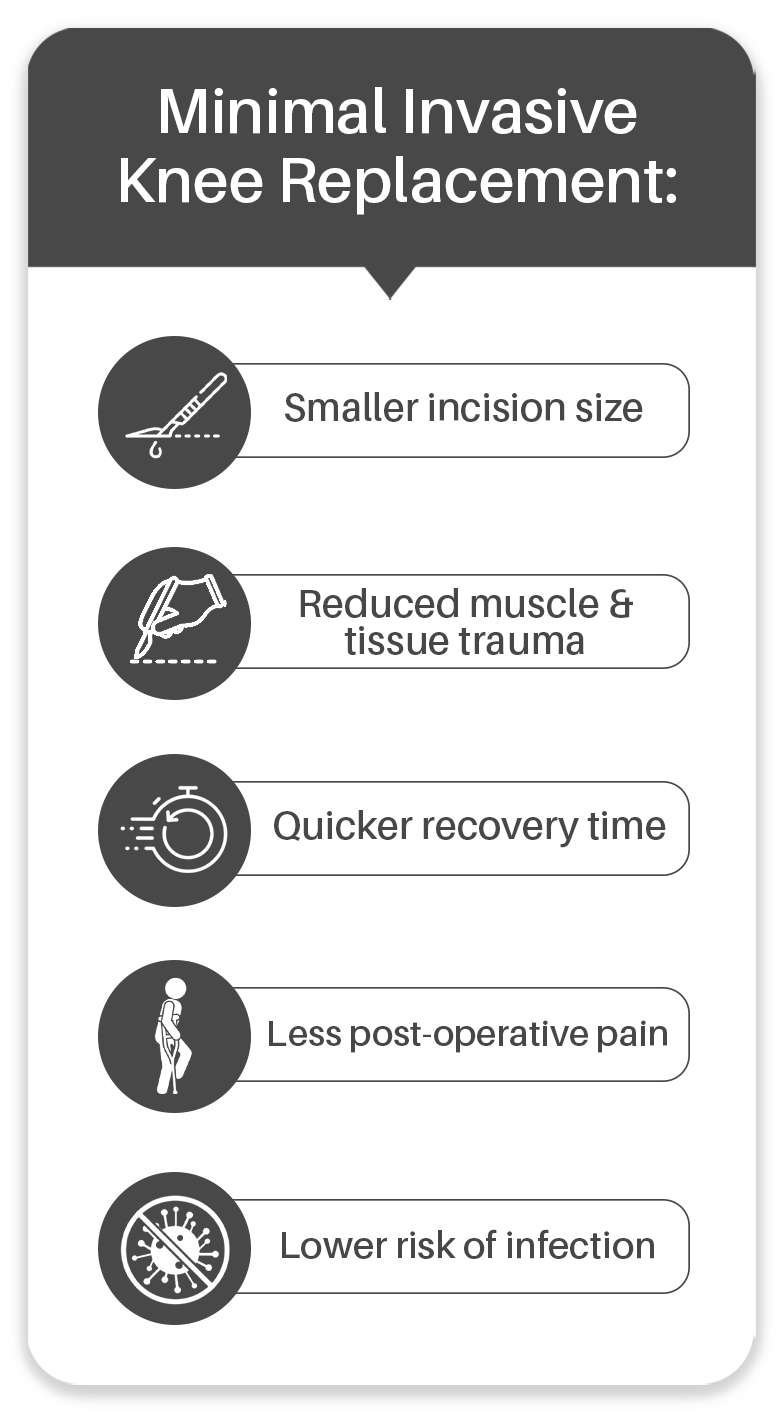




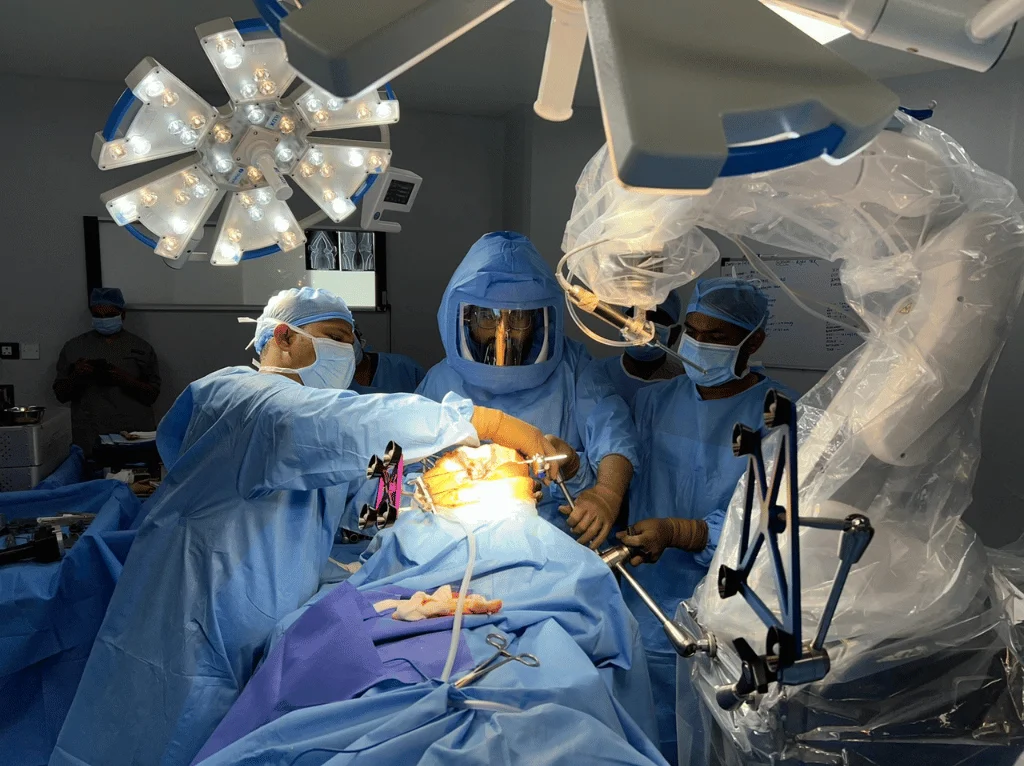
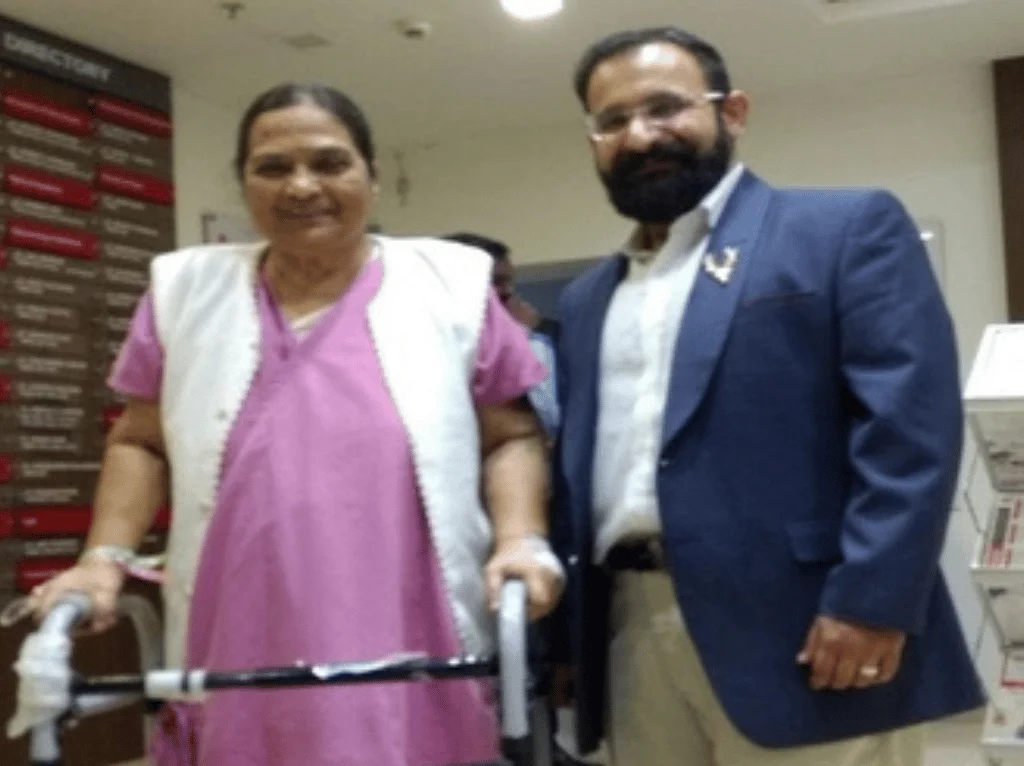
Traditional knee replacement surgery has long been the standard treatment for severe knee arthritis and other degenerative conditions. However, robotic-assisted knee replacement represents a significant leap forward in precision and accuracy. This advanced approach combines the skills of the surgeon with cutting-edge robotic technology to create a customized surgical plan tailored to each patient’s unique anatomy.
At Arora Clinic in Thane, Dr. Bakul Arora, a renowned Robotic knee replacement Doctor in Thane, employs the latest robotic technology to perform knee replacement surgery with precision and expertise. From initial consultation to post-operative care, Dr. Bakul Arora prioritizes patient education, thorough evaluation, and personalized treatment planning to ensure the best possible outcomes for each individual.
Patients who have undergone robotic knee replacement surgery with Dr. Bakul Arora at the Robotic knee replacement specialist clinic in Thane have experienced remarkable improvements in their quality of life. Many report reduced pain, increased mobility, and a renewed ability to engage in activities they once thought impossible.
Robotic Knee Replacement Surgery represents a significant advancement in orthopedic care, offering patients in Thane and beyond the opportunity for a more active and fulfilling life. Under the skilled guidance of Dr. Bakul Arora, individuals suffering from knee arthritis and other debilitating conditions can benefit from personalized treatment plans, enhanced precision, and superior outcomes. As technology continues to evolve, the future of orthopedic surgery looks brighter than ever, promising even greater possibilities for restoring mobility and improving overall well-being.
Yes, robotic surgery can be used for total knee replacement procedures. In fact, it is commonly used for both partial and total knee replacements. The precision and accuracy offered by robotic technology can benefit patients undergoing various types of knee replacement surgeries, ensuring a successful outcome.Is robotic knee surgery better than traditional knee surgery?
Robotic knee surgery is considered an advancement in the field of knee replacement. It offers a higher level of precision and accuracy compared to traditional surgery. This precision can result in better alignment of the artificial joint, potentially leading to improved outcomes, quicker recovery, and less pain. However, the choice between robotic and traditional surgery depends on individual factors, and your orthopedic surgeon can help you determine the best approach for your specific case.
Robotic knee replacement surgery differs from traditional methods in that it offers a higher level of precision. The robotic system provides real-time feedback to the surgeon, allowing for more accurate bone cuts and implant placement, which can lead to better long-term results and reduced pain and discomfort.
Robotic knee replacement surgery has a high success rate, with many patients experiencing significant pain relief, improved mobility, and long-lasting results. Success depends on various factors, including the surgeon’s experience, the patient’s overall health, and adherence to post-operative care and physical therapy. Consult with your surgeon to understand your individual chances of success.
While robotic knee surgery offers several benefits, it’s essential to consider potential disadvantages. These can include the cost, as robotic surgery may be more expensive. Additionally, not all medical facilities offer robotic technology, which can limit access. Furthermore, the technology is dependent on precise imaging, and there can be limitations in certain cases. Discuss these factors with your surgeon to make an informed decision.
The recovery period after robotic knee replacement surgery can vary from person to person. In general, patients can expect to stay in the hospital for a few days, followed by a period of rehabilitation and physical therapy. Most individuals can resume light activities within a few weeks, and a full recovery can take several months. Your surgeon will provide personalized guidance on your recovery timeline.
Pain is a common concern for individuals considering knee replacement surgery. While some discomfort is expected during the recovery process, the use of robotic technology often leads to more precise placement of the artificial joint, which can reduce post-operative pain. Pain management strategies and medications are typically employed to make the recovery as comfortable as possible.
The primary difference between robotic knee surgery and traditional knee surgery lies in the level of precision and technology used. Robotic surgery employs a robotic-assisted system to help the surgeon with planning and executing the procedure with real-time feedback. This precision can result in better alignment of the implant, potentially leading to improved outcomes compared to traditional surgery.
Robotic knee replacement surgery is considered safe when performed by skilled and experienced surgeons. The technology enhances the surgeon’s ability to make precise cuts and implant placements, reducing the risk of complications. As with any surgery, there are inherent risks, and it’s crucial to discuss these risks with your surgeon before making a decision.
On average, a robotic knee replacement surgery takes approximately 1 to 2 hours. However, the duration can vary based on the complexity of the procedure, the surgeon’s experience, and individual patient factors. Your surgeon can provide a more accurate estimate during your consultation.
Some of the benefits of robotic knee replacement surgery include smaller incisions, reduced blood loss, faster recovery times, and greater precision in implant positioning. These factors often result in less pain, improved knee function, and a quicker return to daily activities.
Not everyone is a candidate for robotic knee replacement surgery. Your surgeon will evaluate your specific condition and determine if you are a good candidate based on factors such as the severity of knee arthritis, overall health, and previous knee surgeries. It’s essential to consult with your orthopedic surgeon to determine if this is the right option for you.
In most cases, robotic knee replacement surgery is covered by insurance, but it’s crucial to check with your insurance provider to understand the extent of coverage. Factors like the type of insurance and your individual policy can influence the coverage details.
The recovery period may vary from patient to patient, but typically, you can expect to stay in the hospital for a short period, followed by physical therapy and rehabilitation. Most patients can resume light activities within a few weeks and gradually return to their regular activities over several months.
Like any surgical procedure, there are potential risks with robotic knee replacement surgery. These risks can include infection, blood clots, and complications related to anaesthesia. However, the use of advanced technology in robotic surgery often helps to minimize these risks.
Preparing for surgery typically involves discussing your medical history and current medications with your surgeon, as well as any pre-operative instructions. It’s essential to follow your surgeon’s guidance to ensure a successful outcome.
The success rate of robotic knee replacement surgery is generally high, with many patients experiencing significant pain relief and improved knee function. However, outcomes can vary depending on the individual’s health, the surgeon’s experience, and other factors. It’s important to discuss your expectations and potential outcomes with your surgeon.
WhatsApp us